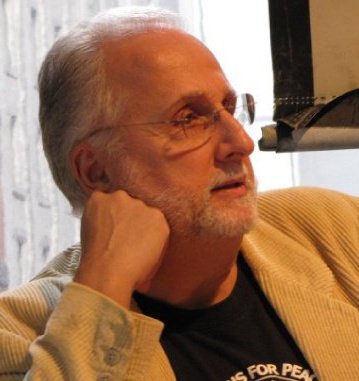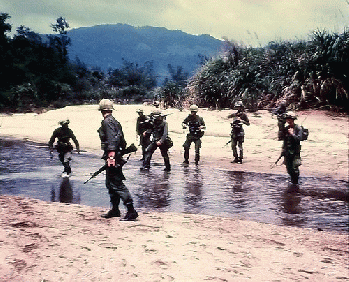Now that the smoke has cleared and the frenzy incited by Ken Burns' and Lynn Novick's self-proclaimed "definitive" documentary on the Vietnam War has subsided (somewhat), there still remains many issues regarding the war, reconciliation, and healing that requires further thought, discussion, and clarification. Much has already been written critiquing and commenting upon the strengths and weaknesses of the filmmakers' presentation of the "many truths" they believed necessary to "tell the story" of the American War in Vietnam. This essay will be less critique and more discussion of the issues and concerns that occurred to me, and I believe are shared by many veterans, as I watched, perhaps endured is better, the 18 hours of archival film, much of it gut-wrenching combat footage, and the testimony of a myriad of participants and observers. Then, as has been my practice, I will shift from a veteran's perspective and what I can only describe as emotional overload, to that of a philosopher, my alter ego, and discuss how I processed this information. It is my hope that this discussion will motivate others to introspect and perhaps, rethink, their interpretation of the Vietnam War experience and its aftermath.
Documentary as Therapy
As I discussed in a previous article anticipating the release of the documentary, I thought it naà �ve or better, misguided, (I am now tempted to say "malicious"), of the filmmakers to suggest to (promise?) vulnerable veterans, as Burns and Novick did repeatedly in a myriad of pre-broadcast interviews and sneak previews, that the aim of the documentary was reconciliation and veteran "healing." Though I had hoped otherwise, I fear my concern and skepticism regarding this claim proved warranted. As I relived the Vietnam experience in great detail for 90-120 minutes on 10 nights with only a two-day respite midway through, other than a familiar, though sickening, release of adrenalin, I experienced no healing, no catharsis. In fact, I felt extremely overwhelmed, exploited, frustrated, outraged, and even re-traumatized. I know some will respond, that if it affected me so profoundly, why didn't I just turn the TV off or switch the station to the "Emmys" or to "Young Sheldon." But after being subjected to all the pre-broadcast hype selling the documentary as curative and as the "definitive" history of the American War in Vietnam, an event that in many respects defined my life, I never felt that option available to me.
On Hate
As I watched and attempted to distance myself from the carnage, I listened to the testimony of John Musgrave, a United States Marine, as he spoke of fearing and hating the enemy. I would add a third response as well, anger. This triad of emotions -- fear, anger, and hatred -- is inevitable in war, an understandable response to the struggle for survival on the battlefield and to the programming and indoctrination warriors are subjected to in Boot Camp/Basic Training, including being conditioned to devalue and dehumanize the "other". As made clear by Army historian General S.L.A. Marshall in his seminal study of warriors returning from battle, human beings have a natural aversion to killing members of their own species and at the moment of truth will become conscientious objectors. Young men and women are not killers by nature, Marshall concludes, not born killers. Warriors who will kill have to be created.
This triad of emotions experienced by warriors in battle is the intended response sought after by tyrants, imperialists, and war profiteers, to accomplish their ends, and for the most part, an important reason warriors continue to fight, die, and kill the "enemy." And the more they fight, and the more they die, the more they hate . . . and the more they kill.
Because this hatred runs deep (how could it not given the horror of battle) and the lies, deception, and mythology so pervasive and continues even till today, what many fail to realize in the heat of the battle is that this hatred, while understandable, is misdirected. The warriors' actual enemy, and the enemy of the state, is not those they face on the battlefield as they are struggling for their freedom against invaders and occupiers. Rather it is our own government, our political leaders who use warriors as instruments of conquest and oppression placing them in extreme situations where they must struggle for their survival . . . making fear, anger, and hatred inevitable.
This process of creating warriors who will kill, of value manipulation and character perversion, foisted on vulnerable young men and women during Boot Camp/Basic Training and reinforced by the intense survival experiences of the battlefield, is foundational to what has recently been recognized as perhaps the signature wound of war, Moral Injury. To achieve healing, if healing is even possible, warriors must re-evaluate their experiences and ultimately realize both their own culpability and how they were, and in many cases continue to be, exploited by those who benefit and profit from their sacrifices and from the blood of innocents.
The Myth of Defending Democracy
As I watched the horror of family members suffering the loss of a child, the slaughter of defenseless civilians by soldiers who have lost their humanity and moral compass, a young child running from a napalmed village shedding her clothes and her skin, I thought about the claim we hear so often (then and now) that the suffering and sacrifice was necessary to defend democracy and a small nation's right to self-determination. As I also alluded to in the earlier article, "South Vietnam" was the product of nation-building, an illegal construct made possible by the intervention of the United States in violation of the provisions of the Geneva Accords that forbade foreign intervention during the interim period of national reconciliation following the defeat of the American funded French colonialists at Dien Bien Phu. Also required by the Accords was a democratic election to unite all of Vietnam within two years -- an election that was prevented from occurring by Saigon's puppet regime and its American overlords.
If the goal of the killing and dying was truly to defend democracy in Vietnam as was and continues to be alleged, why wasn't the 1956 reunification election allowed to occur? The reason, of course, was that Ho Chi Minh would've won hands down . . . and Ho was a Communist. But democracy is a b*tch like that, the people, not the colonialists/imperialists/occupiers, get to choose who wins. You don't truly support democracy by calling off an election for fear that your favored candidate may lose. Millions of lives and billions of dollars, not to mention the heartache and sacrifice suffered by so many on all sides, could've been saved and avoided had we not intervened and instead, let democracy work.
(Note: You can view every article as one long page if you sign up as an Advocate Member, or higher).






